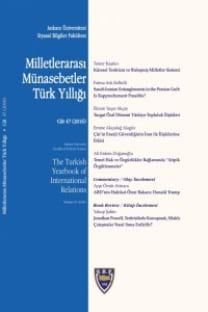How Does Transnational Islamist Terrorism Challenge The Conceptions Of Inter National Security?
How Does Transnational Islamist Terrorism Challenge The Conceptions Of Inter National Security?
This article questions the meanings of international and national security analysing a current security issue, Islamist terrorism, through a critical appıoach to two mainstream conceptions, the narrow territoria one of neorealist tradition and the idea of extended security derived from globalist perspectives of which the final referent object is no longer the State but the individual. Drawing on Regional Security Complex Theory to bridge the opposition between the two and to highlight the interconnectedness of different levels of analysis national, regional, global this article finally suggests that the security threat posed by Islamist neofundamentalism as ideology behind terrorism could also be read in terms of the construction of a transnational identity in opposition to one of the State's traditional sources of identity, the nation. Being, in fact, this new identity founded on the value of universalism, it is transnational not only territorially but also because it opposes a national dimension both culturally and politically. Consequently, such opposition can be understood as an issue of national security - especially in multi-national states in vvhich however one nation is dominant över the others vvithin the territory - as it competes with, offers itself as alternative to one of the three elements that form the State, its identity vvhich is the bonding agent between its governing institutions and its physical base; and has also repercussions in terms of international security because in an international system formed predominantly by states, it questions the idea of the modern state rather than just its incapacity to deal vvith international problems.
Keywords:
Security, Terrorism, Political islam, Globalisation identity,
- ISSN: 0544-1943
- Yayın Aralığı: Yıllık
- Başlangıç: 1960
- Yayıncı: Ankara Üniversitesi Siyasal Bilgiler Fakültesi Uluslararası İlişkiler Bölümü
Sayıdaki Diğer Makaleler
Turning Point Of Turkish-Arab Relations; A Case Study On The Hijaz Revolt
The Citizenship Debate Of The 2000s In Perspective: Securitized Citinzenship And The Modern Dilemma
THE RECONSTRUCTION OF ARMENIAN IDENTITY IN TURKEY AND THE WEEKLY AGOS*
How Does Transnational Islamist Terrorism Challenge The Conceptions Of Inter National Security?
THE NEW GLOBAL CLASS ARCHITECTURE: NEOLIBERALISM AND CLASS FORMATİON
